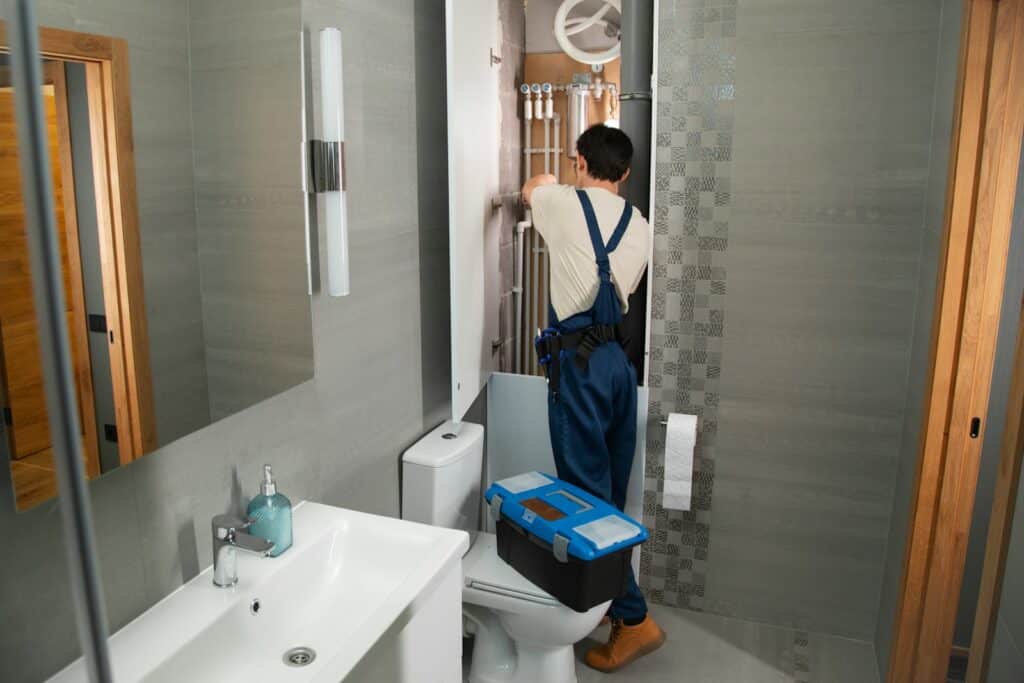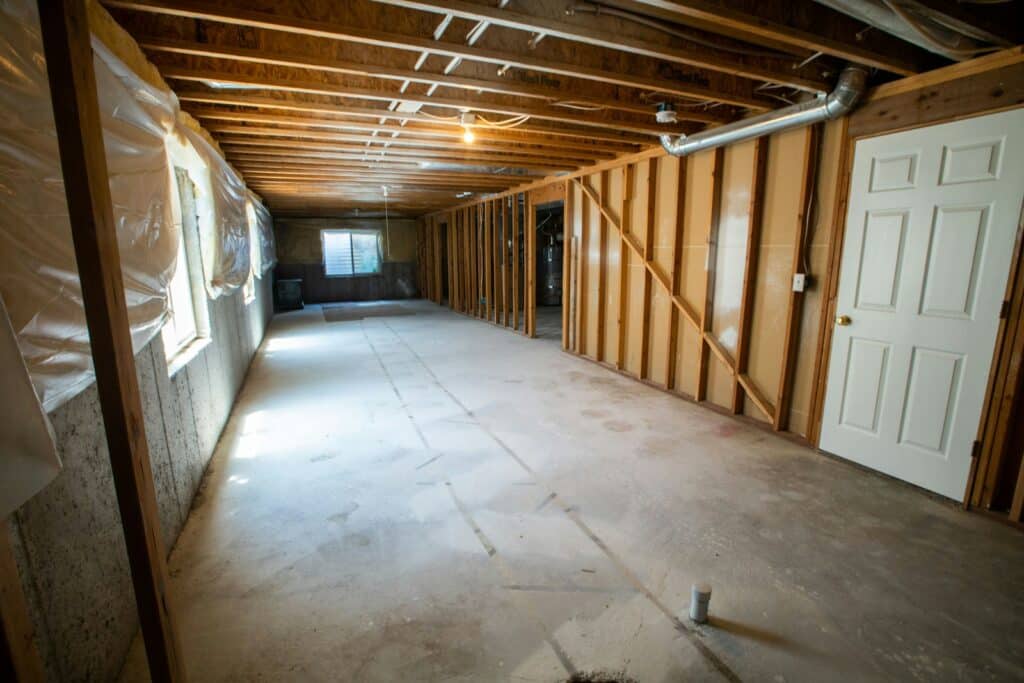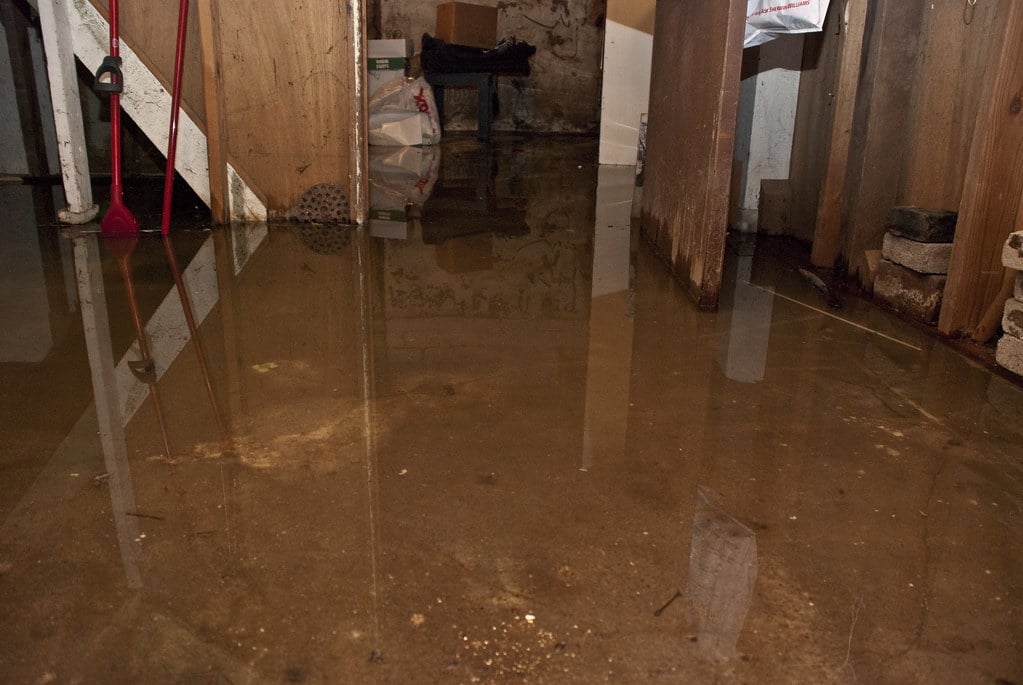Basement flooding is every homeowner’s nightmare. Few things are more stressful than seeing your basement floor covered in water or, worse, sewage. Whether it’s caused by heavy rainfall, a burst pipe, or a faulty drainage system, basement flooding can lead to serious property damage, mold growth, and costly repairs.
But don’t worry. We’re here to help you take proactive measures to prevent basement flooding and guide you through practical solutions if disaster strikes.

Photo by bhagya laxmi on Unsplash
Why You Need a Trusted Routine Plumber for Maintenance
Having a reliable and experienced plumber on your side can save you time, money, and stress in the long run. Here are the key reasons why maintaining a trusted relationship with a routine plumber is essential for every homeowner:
- Preventative Maintenance: Regular plumbing maintenance can help identify small issues before they turn into major, costly problems. A routine plumber can inspect your system for hidden leaks, clogged drains, or corrosion, ensuring your home’s plumbing system operates efficiently.
- Emergency Assistance: Plumbing emergencies, such as burst pipes or overflowing toilets, can happen at any time. Having a trusted plumber means you know exactly who to call in a crisis, reducing stress and ensuring quick, effective solutions.
- Consistent Quality of Work: Building a relationship with a reliable plumber ensures consistency in the quality of work. Over time, they become familiar with your home’s plumbing system, allowing for more effective maintenance and repairs tailored to your specific needs.
- Long-Term Cost Savings: With routine maintenance, you’ll avoid expensive repairs caused by neglect or delayed fixes. Additionally, a trusted plumber can provide valuable advice on upgrades and replacements, helping you make cost-effective choices for your home.
- Peace of Mind: Knowing that a qualified professional handles your plumbing needs offers peace of mind. You can trust them to resolve issues effectively and maintain the integrity of your home’s plumbing system.
Investing in a routine plumber is an investment in the health of your home. By working with a trusted professional, you ensure that your plumbing system remains reliable and well-maintained for years to come.

Photo by Real Twin Photos on Unsplash
Common Causes of Basement Flooding
Understanding the root causes of basement flooding is the first step in prevention. The factors below are the most common culprits.
Poor Lot Grading
If your property slopes toward your home instead of away from it, surface water from rain or melting snow can pool around your foundation. Over time, this water can find its way into your basement.
Heavy Rainfall
During periods of heavy rain, water flow from overland flooding or overwhelmed storm sewers can quickly saturate the ground. When the soil around your home can no longer absorb water, it may flow into your basement.
Sewer Backup
When the city’s sanitary sewer or storm sewer systems are overwhelmed, the water may back up into your home through floor drains, toilets, and sinks. This is especially common in older neighborhoods where infrastructure may not have been updated.
Foundation Cracks
Cracks in your foundation walls or floor allow groundwater to seep into your basement. If these cracks aren’t sealed, they can enlarge over time, increasing the risk of flooding.
Faulty Drainage System
If your drainage system isn’t working properly, whether it’s your weeping tile system, sump pump, or gutters, it may fail to divert water away from your home efficiently.
Tree Roots
Tree roots can infiltrate your sewer pipes, causing blockages that lead to significant flooding in and around your basement.
Burst Pipes
A burst pipe is one of the fastest ways to flood a basement. This may happen due to freezing temperatures or deteriorating pipes, leaving standing water in the affected area.
Steps to Prevent Basement Flooding
While some causes of flooding are beyond your control, there are several ways to fortify your basement against water damage.
Check Your Lot Grading
Ensure that your property slopes away from your house to direct water flow outward. You can add soil near your foundation to improve grading or hire a professional landscaper for more extensive adjustments.
Maintain Your Drainage System
- Clean Your Gutters and Downspouts: Clear out leaves, dirt, and debris regularly. Ensure downspouts extend at least six feet away from your foundation.
- Inspect Your Weeping Tile System: Your foundation drains or weeping tiles should channel water away from your house. If that’s not happening, they may need to be repaired or replaced.
- Test Your Sump Pump: A working sump pump is your first line of defense during heavy rain or overland flooding. Test it regularly and consider installing a backup power source to keep it running during power outages.
Fix Cracks and Leaks
Seal any cracks in your basement walls or floor with waterproof epoxy or an equivalent sealant. Check windows and doors for leaks, and replace the weather stripping if needed.
Install a Backwater Valve
A backwater valve will prevent sewage from backing up into your basement through floor drains or toilets. Be sure to have it installed by a licensed plumber.
Clear Tree Roots
If tree roots are causing blockages in your sewer line, a professional plumber can use specialized equipment to remove them and restore proper water flow.
Improve Basement Windows
Install window wells and cover them to keep water from pooling near your basement windows. Check for proper seals around your windows to block moisture.

“Basement Flooding” by CR Artist is licensed under CC BY-NC-ND 2.0
What To Do If Your Basement Floods
Even with the best precautions, a flooded basement can still occur. When it does, follow these steps to minimize damage and protect yourself.
Safety First
- Turn Off Electricity and Gas: Do not enter a flooded basement until you’ve shut off power and gas at the main source. Contact your local gas company if you’re unsure how to do this safely.
- Wear Protective Gear: Rubber boots, gloves, and goggles are essential when dealing with water in your basement, especially if there’s sewage present.
Remove Water Immediately
Start water removal as soon as it’s safe to do so. Use a wet/dry vacuum, pump, or buckets to remove standing water. For overland flooding or large amounts of water, professional water removal services may be necessary.
Dry and Clean the Basement
- Remove all wet items, including furniture, carpets, and personal belongings.
- Wash affected surfaces with soap and clean water to remove contaminants.
- Use fans and dehumidifiers to speed up the drying process and prevent mold growth.
Document Damage
Take photos and videos of the flooded area and damaged items for insurance purposes. Note how long the water was present if it’s been more than four hours, as this can influence coverage.
Contact Your Insurance Company And Call A Professional Cleaning Company
Call your insurance company immediately to report the basement flooding and start the claims process. Be aware that not all policies cover overland flooding or sewer backup, so review your coverage carefully.
Benefits of Insurance for Basement Flooding
Basement flooding can be a homeowner’s nightmare, leading to costly repairs, damaged belongings, and the stress of restoring your home. Having insurance coverage for basement flooding offers several valuable benefits:
Financial Protection
Flooding can result in significant damage to flooring, walls, furniture, and personal items. Insurance coverage alleviates the financial burden by covering a portion or all of the restoration costs, helping you avoid out-of-pocket expenses that can quickly add up.
Peace of Mind
Knowing that your home is protected against unexpected flooding events provides peace of mind. You can rest assured that in the event of a disaster, you won’t be left to handle the financial and logistical challenges alone.
Swift Response and Assistance
Most insurance providers offer quick support when filing claims, ensuring that repairs and restoration begin as soon as possible. Some plans may also connect you with trusted contractors, simplifying the recovery process.
Protection for Personal Belongings
Many insurance policies extend coverage to include damaged personal belongings in your basement, such as electronics, furniture, or stored valuables. This added layer of protection can be instrumental in recovering after a flood.
Compliance with Mortgage Requirements
For homeowners with a mortgage, carrying flood insurance may be a requirement. By maintaining adequate coverage, you ensure compliance with lender requirements and protect your most significant investment.
Investing in insurance for basement flooding is a proactive step that safeguards your home and finances, allowing you to address unforeseen events with confidence and security.
Seek Professional Help With GAEPlumbing & Heating
How GAE Plumbing & Heating Can Help
When basement flooding or other plumbing emergencies arise, GAE Plumbing & Heating is your reliable partner in resolving issues quickly and effectively. Our team of highly trained professionals specializes in a wide range of services, from handling emergency flooding situations to addressing everyday plumbing needs. With state-of-the-art equipment and years of experience, we can identify the source of your basement flooding, implement effective drainage solutions, and help prevent future occurrences.
Beyond flood management, GAE Plumbing & Heating provides comprehensive services, including water heater repair, drain cleaning, pipe replacement, and routine maintenance. Our commitment to exceptional service ensures that your home’s plumbing system remains in top condition, giving you peace of mind during any unexpected situations. Trust GAE Plumbing & Heating for prompt, reliable, and professional solutions tailored to your specific needs.
Is Your Home at Risk For Property Damage?
Review the history of flooding in your area and the state of your home’s infrastructure. Conduct routine maintenance on your drainage system, sump pump, and floor drains to stay ahead of potential issues. If you notice foundation cracks, poor lot grading, or a sewer backup risk, address these concerns promptly with the help of licensed plumbers or property specialists.
Helpful Resources on Basement Flooding
Here are six valuable resources and websites to help you learn more about basement flooding and how to address it:
- FEMA Flood Preparedness: A comprehensive guide on flood preparedness and recovery provided by the Federal Emergency Management Agency (FEMA). This resource includes information on reducing flood risks, creating safety plans, and accessing financial assistance if needed. FEMA – Floods
- American Red Cross – Flood Safety Tips: The Red Cross provides practical tips on flood safety, including how to prepare your home, family, and pets for flooding. It also offers advice on what to do during and after a flood. Red Cross Flood Safety
- National Flood Insurance Program (NFIP): Learn about flood insurance options, coverage details, and how to protect your property financially through the NFIP. The site also has tools to assess your property’s flood risk. NFIP Flood Insurance Information
- EPA – Managing Water in Your Basement: The Environmental Protection Agency offers insight into managing water intrusion in basements, with tips on identifying leaks, improving ventilation, and maintaining sump pumps. EPA Basement Water Management
- State, Local And Government Resources: Check your state or local government website for area-specific flooding information, emergency contacts, and resources. Many cities provide maps of flood-prone areas and guidance on minimizing water damage. https://www.epa.gov/flooded-homes/additional-resources-and-help
- This Old House – How to Stop Basement Flooding: An in-depth article covering practical steps homeowners can take to prevent basement flooding, including grading the landscape, maintaining gutters, and installing drainage systems. How To Stop Basement Flooding – This Old House
These resources are invaluable for understanding, preparing for, and managing basement flooding scenarios effectively.
Protect Your Home From A Future Flooded Basement
Basement flooding can be costly and disruptive, but with proper preventative steps, you can protect your home and belongings from water damage. Whether it’s maintaining your sump pump, fixing foundation cracks, or sealing basement windows, even small changes can make a big difference. When in doubt, don’t hesitate to seek professional help to ensure everything is working properly.
Take charge today to ensure a dry, safe, and flood-free basement tomorrow.


